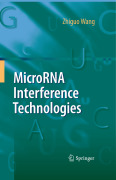
MicroRNAs (miRNAs), endogenous noncoding regulatory mRNAs of around 22-nucleotides long, have rapidly emerged as one of the key governors of the gene expression regulatory program in cells of varying species, with ever-increasing implications in the control of the fundamental biological processes and in the pathogenesis of adult humans. The exciting findings in this field have inspired us with a premise and a promise that miRNAs will ultimately be taken to the heart for therapy of human disease. While miRNAs have been considered potential therapeutic targets for disease treatment, it remains obscured what strategieswe can use to achieve the goal. In the past years, we have witnessed a rapid evolving of many creative, innovative, inventive strategies and methodologies pertinent to miRNA research and applications. These technologies have convincingly demonstrated their efficacy and reliability in producing gain-of-functionor loss-of-function of miRNAs through targeting miRNA expression/biogenesis/function, providing new tools for elucidating miRNA functions and opening up a new avenue for the development of new agents targeting miRNAs for therapeutic aims. The present book provides comprehensive descriptions of these technologies and their applications to miRNA research and to new drug design for miRNA-related diseases. It starts with an overview of up-to-date knowledge of miRNA biology and the potential of miRNAs as therapeutic targets for human disease, followed by an introduction of the new concept of miRNA interference (miRNAi) and the perspectives of miRNAi technologies in general terms. In the following,each chapter introduces one of the miRNAi technologies with detailed descriptions of state-of-the-art design, procedures, principles and applications to basic research, R and D and clinical therapy.
- ISBN: 978-3-642-00488-9
- Editorial: Springer
- Encuadernacion: Cartoné
- Páginas: 193
- Fecha Publicación: 22/06/2009
- Nº Volúmenes: 1
- Idioma: Inglés
